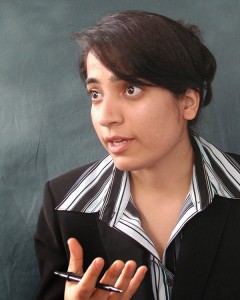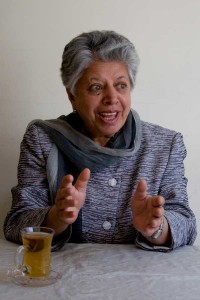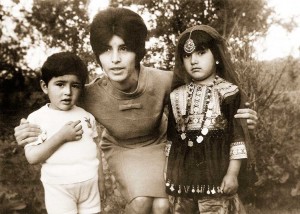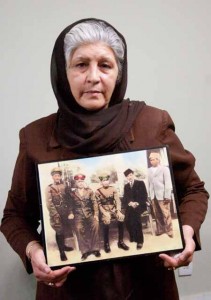Peggy Kelsey
Meeting Malalai
Tuesday, December 4th, 2012
 When I heard that Malalai was touring the US, I flew to Sonali Kolhatkar’s (author of Bleeding Afghanistan) California home where the young Afghan would be staying, to meet her. When Malalai walked into living room she seemed quiet and shy but once we began the interview, she became animated and energetic.
When I heard that Malalai was touring the US, I flew to Sonali Kolhatkar’s (author of Bleeding Afghanistan) California home where the young Afghan would be staying, to meet her. When Malalai walked into living room she seemed quiet and shy but once we began the interview, she became animated and energetic.
Malalai is most famous for her short speech as an elected member of the constitutional Loya Jerga (2003), when she addressed the elephant in the room that Afghans were already cognizant of and asked, how Afghanistan could become a democracy when there were warlords and criminals in the government. The audience erupted into angry chaos and her three-minute allotted speaking time was cut short after only a minute and a half. Angry lawmakers threw empty water bottles at her and shouted insults and death threats. Supporters and UN security forces gathered around to shield her. She was only 24 at the time. I met her during her first tour of the United States in 2006, after she had been elected as one of 249 Members of Parliament. Her outspokenness got her in trouble there as well and a year and two months later she was banned from that institution also.
At first, I wondered why she didn’t bite her tongue and try to work peacefully to make changes in the laws affecting women. Surely, that would be a more effective way to change women’s lives. Why stir the hornet’s nest? But then I realized that she wasn’t speaking to the other MPs, who already knew the situation, but to the international press and development leaders who were ready to pour billions in to Afghanistan’s reconstruction. They, too, were likely aware of the horrific human rights records of some of the MPs, but Malalai’s speaking out made that awareness public.
Malalai is also important because she’s a voice from a region across the country from Kabul. Most non-embedded reporters work from Kabul and investigate stories from there. Their view, the dominant one in the media, comes from that perspective and it’s very helpful to hear the voice of someone from conflict areas, especially a woman’s voice.
There is more of my interview with Malalai as well as with other Parliamentarians and women from all walks of life in my book, Gathering Strength: Conversations with Afghan Women which is available in many online bookstores as well as my publisher’s site, Pomegranate Grove Press.
****
Peggy Kelsey created the Afghan Women’s Project and in 2003 and 2010 traveled to Afghanistan to photograph and interview women. She shares her dynamic slide presentations with audiences around the world. Her book, Gathering Strength: Conversations with Afghan Women, came out in October, 2012.
Posted in Afghan Women's Project, Afghanistan, AWP 2010, Links, Other, Peggy Kelsey, Uncategorized, women | Comments Off on Meeting Malalai
Writing: Gathering Strength: Conversations with Afghan Women
Sunday, September 30th, 2012
Gathering Strength, my book of conversations with Afghan women, is published! I will have books in my hands by October 8th and on Amazon sometime around early November. (email me if you want me to send you a copy before November.) The writing process has taken nearly two and a half years but really, Gathering Strength is the culmination of ten years with The Afghan Women’s Project including two trips to Afghanistan.
It’s been over a year since my last post. I couldn’t tear myself away from writing and editing to write about the book. Now it’s the end of an era of narrow focus with a workaholic intensity.
When I started working on Gathering Strength I never imagined that I was capable of creating a work this profound and this beautiful. Of course it wasn’t all, or maybe even mostly my doing. Editing, layout and cover design have shaped this book into a form worthy of the Afghan women who shared their thoughts and stories with me.
From my last day in Afghanistan in May 2012, when I realized that I needed to and could write a book, I only knew that that I’d need an editor and that I would self-publish so I could maintain control over the material and the timing of publication. As I worked, I found that this book had a life and timing of its own and all I could do was to work as hard as I could (in a way balanced for the long haul) and be open to what came my way. Realizing that probably kept me from going crazy while trying to select from the myriad publishing and other options and it helped me be patient with my unrealistic imagined timeframe.
Thankfully, during the writing and editing, when I awoke in the mornings, I was driven out of bed to begin the day’s writing, a much different experience from the resistance I’d felt during past writing efforts. By the end I couldn’t wait for the writing/editing to be completed, but I never felt it to be drudgery.
As I wrote my early drafts, I dreamed of handing over the manuscript to someone who would transform it into a finished book for me; a knight in shining armor. Oh, well, that didn’t happen. Instead, I worked closely with my editors, going back and forth over different points, sometimes changing my mind, sometimes not. It felt good to have the last word.
The transition from writing and managing my book project to putting it out into the world has been difficult. I suddenly find myself procrastinating and being distracted by the many different fronts I have to engage. Hopefully, soon, I will find my stride. Frequent posting in this blog is one of those new efforts.
I’ll end this post with a quote from the only writer in Gathering Strength, Roya. She says:
I’m going to change my life and think differently. I’m going to experience the things that are my right. I have to show my sisters, my friends, my family, and Afghan women all over the world that we can change if we have a chance.
Posted in Afghan Women's Project, AWP 2010, Other, Peggy Kelsey, Uncategorized, writing process | Comments Off on Writing: Gathering Strength: Conversations with Afghan Women
Suraia Perlika
Thursday, March 3rd, 2011
You will be able to read about the further exploits of Tajwar in my book which is scheduled to be out in January of 2012. Her life story is the story of the “freedom fighters” as she called them.

I’m now working on Suraia Perlika’s life story which tells of another woman also working for women’s rights and education, but from the Comunist side. She was one of the founders of the Democratic Women’s Organization which was supported by the Communists and also used as propaganda by them to show how much they’ve improved the lives of Afghan women. Ultimately, they imprisoned Suraia and put her on the “death list” but at the last minute she was pardoned by a rival Communist faction who had just come to power. She revived the Democratic Women’s Organiation as the Afghan Womens’ Union and gave herself the made-up name, Suraia Perlika.
Posted in Afghan Women's Project, AWP 2010, education, Other, Peggy Kelsey, political, Suraia Perlika, women | Comments Off on Suraia Perlika
Tajwar Kakar part 2 Life under the Communists
Friday, January 21st, 2011
 My mother engaged me when I was 12, I was married at 14 and had my first child at 15. My husband was Uzbek (which means that he spoke Uzbek as a first language and he had many customs I wasn’t used to. I was his second wife. He was a very powerful man and was always having guests over. So, every other night I had to prepare large dinners for them as well as keep up with my school work (I was in 8th grade when I married) and take care of my children. I never had any help, I did all the work myself.
My mother engaged me when I was 12, I was married at 14 and had my first child at 15. My husband was Uzbek (which means that he spoke Uzbek as a first language and he had many customs I wasn’t used to. I was his second wife. He was a very powerful man and was always having guests over. So, every other night I had to prepare large dinners for them as well as keep up with my school work (I was in 8th grade when I married) and take care of my children. I never had any help, I did all the work myself.
Before the government changed, I had a normal life, a happy life. I finished my schooling and taught for 5 years in Kunduz high school. And after that I became headmaster. But when the government changed. and the king’s cousin, Daoud came into power the Communists began trying to register people. All of my husband’s family became members of the communist party. They especially wanted me to join because my father had been so powerful and so popular, But I rejected it. And so, I was the first woman who got fired from her job. For 3 months I stayed home but eventually they assigned me to another school and watched me very closely so that I couldn‘t contact my friends.
After a year, they sent me to Kabul and every subsequent year they sent me to a different school and gave me different subjects to teach. Every week they came into my classroom and pushed me to join the Communist party. They promised to give me a good position. They offered to send me to Russia or Poland to get my Master’s degree, but I refused it all, knowing that I would be forced to become Communist. They send me from school to school so I wouldn’t have a chance to make friends. But that was a good chance for me. I found a lot of my friends and my teachers and old students. During these 4 years they were arresting people twice a month . They arrested me in 1980. At that time, my oldest child was 14 and my youngest was 5.
In early 1980, whenever the Communists saw any young men they conscripted them and sent them to war. At one point they had arrested 150 men and asked each of them who was working for the freedom fighter women and they gave my name. Three people were witnesses saying that I was the head of women freedom fighters in Kabul. At first they put me in a KBG jail to do an “inquiry”. There I was tortured with electic shock. A lot of people died there. After a month they put me in another jail for a year. The whole time I refused to give any names or information and after a year I was released.
When they let me go, they made me sign a letter saying that if they find that I have any connection with freedom fighters, they will kill me. I signed that paper. When I got out they sent me back to Kunduz and I found that they had punished my children in a different way by telling them bad things about me. At the same time, the Afghan Communists were attacking villages, people’s houses, raping their women and killing their husbands and their children. So I became the freedom fighter leader in that city.
So, they sent me back to Kunduz and I found that they had punished my children in a different way by telling them bad things about me. At the same time, the Afghan Communists were attacking villages, people’s houses, raping their women and killing their husbands and their children. So I became the freedom fighter leader in that city.
Posted in Afghan Women's Project, Other, Peggy Kelsey, Tajwar Kakar, women | Comments Off on Tajwar Kakar part 2 Life under the Communists
Tajwar Kakar Part 1, Birth Story plus 2011 Update
Sunday, January 9th, 2011
I’ll begin 2011 with the amazing birth story of Tajwar Kakar, a woman I met on my trip in 2003 and again this past spring. I’d love to see her life portrayed on the big screen.
Tajwar Part 1 Birth Story
In 1948, Tajwar’s soon-to-be father was commissioner of the border between the Soviet Union and Afghanistan. The Russians* had gotten control of the Amu Darya River, also known as the Oxus, which runs along the northern side of Afghanistan, and were trying to make the border on the Afghan side of the river. “My father didn’t let them,” Tajwar told me. Six times before, Afghans had tried to negotiate a mid-river border, but had failed. “My father was brought from his post in Farah Province to meet with King Zahir Shah and head up the delegation. Before he left, my grandmother told him that my mother was pregnant. He told my mother that it doesn’t matter whether this child is a girl or a boy, but ‘if I get the river from Russia then it will be a lucky child for me. If I lose this river and Russia makes the border inside Afghanistan, this will be an unlucky child and I never want to see its face.'”
“So every time my grandmother prayed she would say ‘Allah, please help that man. This is an innocent child. When he says he will do this he will because he‘s a very strong Pashtun.’ My grandmother prayed every day that my father would get the river back. On the same day I was born he won back the river.”
“When he got the river he called to his people and told them to bring my child to the border. My grandmother said that I was too young but some people came and made a basket from branches and some very nice cloth. I was put inside and they took off for the border. More than 5000 people followed. When I arrived, my father put me in the boat and we went out into the river where he gave me the name Tajwar which means crown.”
“When he got back to Kabul, my father warned the king about Russia’s intention to invade Afghanistan and of his cousin, Daoud’s intention to help bring it about. Mr. Kakar was ignored, but his sympathies became known within the palace.”
“We moved to Kunduz when I was nine. Two years later, my father was poisoned by Daoud’s people because he was a powerful man and he didn’t support the Russians.”
*Tajwar always referred to the Soviets as Russians, but there were many Soviet troops from Kazakhstan as well as the other satellite states in addition to the Russians.
UPDATE
It’s been months since I’ve updated my blog. But with a new year comes a new determination to be more present in this space. 2010 brought my second Afghan Women’s Project trip to Afghanistan and its subsequent six months of interview transcription and image processing. Finally, my new presentation, Afghanistan 2010, a View from the Ground was crafted and debuted.
2011 will be the year of writing my book on the subject as well as giving presentations throughout the country. In addition to commentary on issues, I will be posting here in this blog elements from the book plus reviews of books pertaining to Afghanistan that I’ve read. And I resolve to post more regularly.
Posted in Afghan Women's Project, AWP 2010, education, Other, Peggy Kelsey, Tajwar Kakar, Uncategorized, women | Comments Off on Tajwar Kakar Part 1, Birth Story plus 2011 Update
